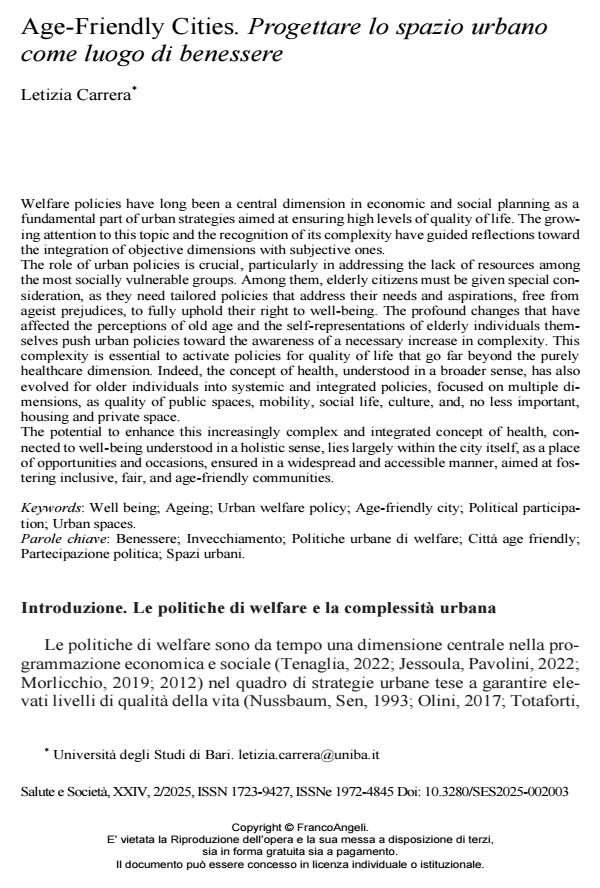Age-Friendly Cities. Progettare lo spazio urbano come luogo di benessere
Journal title SALUTE E SOCIETÀ
Author/s Letizia Carrera
Publishing Year 2025 Issue 2025/2
Language Italian Pages 16 P. 20-35 File size 463 KB
DOI 10.3280/SES2025-002003
DOI is like a bar code for intellectual property: to have more infomation
click here
Below, you can see the article first page
If you want to buy this article in PDF format, you can do it, following the instructions to buy download credits

FrancoAngeli is member of Publishers International Linking Association, Inc (PILA), a not-for-profit association which run the CrossRef service enabling links to and from online scholarly content.
Welfare policies have long been a central dimension in economic and social planning as a fundamental part of urban strategies aimed at ensuring high levels of quality of life. The growing attention to this topic and the recognition of its complexity have guided reflections toward the integration of objective dimensions with subjective ones. The role of urban policies is crucial, particularly in addressing the lack of resources among the most socially vulnerable groups. Among them, elderly citizens must be given special consideration, as they need tailored policies that address their needs and aspirations, free from ageist prejudices, to fully uphold their right to well-being. The profound changes that have affected the perceptions of old age and the self-representations of elderly individuals themselves push urban policies toward the awareness of a necessary increase in complexity. This complexity is essential to activate policies for quality of life that go far beyond the purely healthcare dimension. Indeed, the concept of health, understood in a broader sense, has also evolved for older individuals into systemic and integrated policies, focused on multiple dimensions, as quality of public spaces, mobility, social life, culture, and, no less important, housing and private space. The potential to enhance this increasingly complex and integrated concept of health, connected to well-being understood in a holistic sense, lies largely within the city itself, as a place of opportunities and occasions, ensured in a widespread and accessible manner, aimed at fostering inclusive, fair, and age-friendly communities.
Keywords: Well being; Ageing; Urban welfare policy; Age-friendly city; Political participation; Urban spaces.
Letizia Carrera, Age-Friendly Cities. Progettare lo spazio urbano come luogo di benessere in "SALUTE E SOCIETÀ" 2/2025, pp 20-35, DOI: 10.3280/SES2025-002003